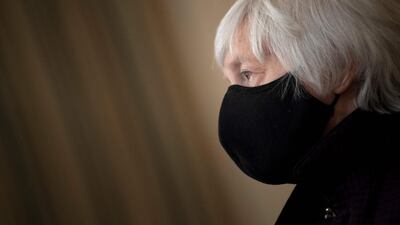Treasury Secretary Janet Yellen said interest rates may have to rise modestly to prevent the US economy from overheating due to higher levels of government spending, without specifying a time frame.
"It may be that interest rates will have to rise somewhat to make sure our economy doesn't overheat," Ms Yellen said in an interview with The Atlantic. "It could cause some very modest increases in interest rates."
Stocks briefly extended their losses on Tuesday and the dollar touched session highs following Ms Yellen’s remarks. The yield on 10-year Treasuries pared declines.
The comments from Ms Yellen, a former chair of the Federal Reserve, come amid a debate on whether President Joe Biden’s proposed and enacted government spending could spur a surge in price pressures. Administration and Fed officials both have consistently dismissed concerns over accelerating inflation. They’ve argued that price gains expected this year will be largely transitory and that the central bank has tools to contain any persistent effects.
The Biden administration has been careful to avoid a pattern of commenting directly on Fed policy in the way that former President Donald Trump did, with Mr Biden even saying last month he hadn’t met with Fed Chair Jerome Powell, out of respect for the central bank’s independence.
Economists who follow the Fed said it wasn’t clear whether Ms Yellen was referring to short-term interest rates controlled by the central bank or longer-term rates determined by how financial markets react to economic conditions.
“It should not come as a shock that the two very large spending bills being contemplated would push longer-term interest rates higher”, either through stronger economic growth or by changing expectations among investors for when the Fed will raise rates, said Michael Gapen, chief US economist at Barclays Plc.
“That’s consistent with what markets would say.”
Mr Gapen said he did not think the comments represented a preference for how the Fed should be managing the impact of government spending.
“Secretary Yellen certainly understands” the Fed’s independence, White House Press Secretary Jen Psaki said at a briefing Tuesday. Ms Psaki also said that Mr Biden agrees with Ms Yellen and that “we also take inflationary risk incredibly seriously".
“I don’t think she was making a statement about monetary policy,” said Roberto Perli, a former Fed economist who is now at Cornerstone Macro LLC.
“I’m inclined to read it in terms of longer-term rates – in which case, it’s a fairly innocuous statement.”
When Fed officials last issued projections in March, they forecast no move in interest rates until at least 2024.
Ms Yellen insisted that the heavy spending Mr Biden is calling for would provide a net benefit to the economy, even if interest rates do go up.
“These are investments our economy needs to be competitive and to be productive and I think our economy will grow faster because of them,” Ms Yellen said.
The Biden administration has proposed additional spending packages totalling about $4 trillion on top of the $1.9tn it pumped into the economy beginning in March to combat the impact of the Covid-19 pandemic.
“This has a demand effect on the economy but really it’s going to have important supply effects on the economy,” Ms Yellen said.

